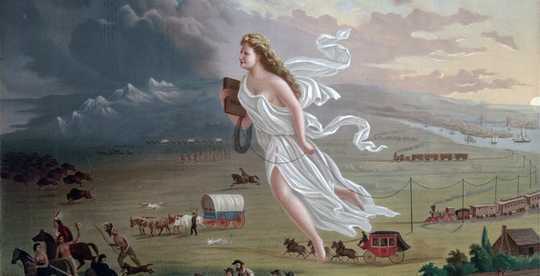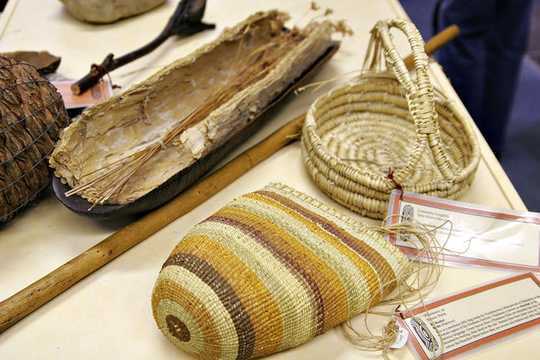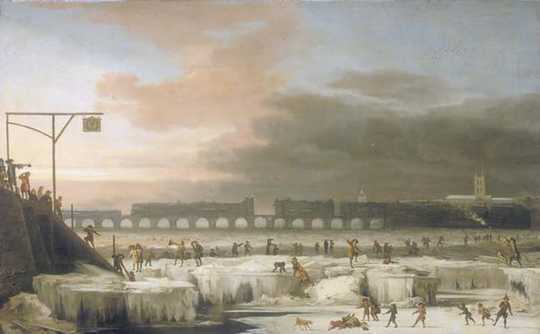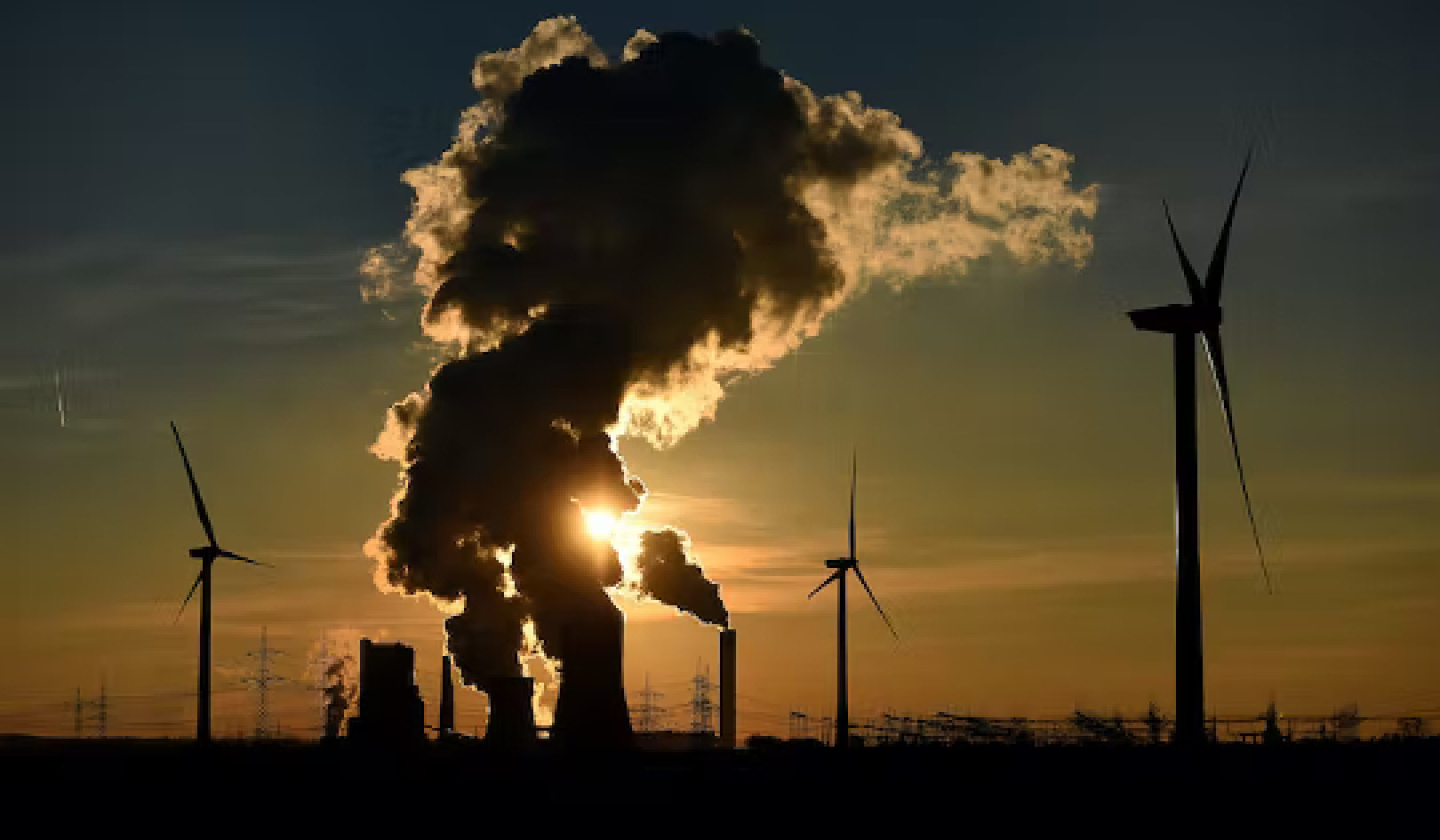 ‘American Progress’ by John Gast. Wikipedia
‘American Progress’ by John Gast. Wikipedia
One reason why people find it difficult to think about climate change and the future may be their understanding of human history. The present day is believed to be the product of centuries of development. These developments have led to a globalised world of complex states, in which daily life for most people is highly urbanised, consumerist and competitive.
By this account, humanity has triumphed over the dangers and uncertainties of the natural world, and this triumph will continue to unfold in the future. Anything else would seem to be going “backwards”, in a world where “backwardness” is pitied or despised.
But it is now clear that we haven’t triumphed. The future has become very uncertain and our way of thinking needs to change. Could new historical narratives help? How might they look?
Progress towards oblivion
The current view of the past, present and future as a trajectory of progress is constantly reiterated by politicians and taught to children in schools. It does not offer many alternatives to the ideas and practices driving climate change and ecological breakdown.
There is a reassuring promise in this narrative that things naturally improve with time, requiring no commitment from ordinary people. Progress is delivered through steady work by governments and scientists, with moments of transformation by activists or visionaries. The direction of history itself is towards the general good.
It is very hard, then, for anyone thinking in this framework to imagine a future in which societies adapt to the challenges of climate change. This is especially the case where adaptions might have to take the form of significantly reduced consumption, unfamiliar forms of social organisation, and harder work to produce food or manage local environments.
 Ecologically benign societies are difficult to imagine when all previous human history is a story of domination and consumption. 3000AD/Shutterstock
Ecologically benign societies are difficult to imagine when all previous human history is a story of domination and consumption. 3000AD/Shutterstock
These ideas about the future look very different from the technologically advanced and globalised tomorrow that the progress narrative seemed to promise. At present, ideas in popular culture about the impact of climate change are often apocalyptic and dystopian. Ideas about mitigating climate change seem limited to fantasies of last-minute salvation by scientific genius or alien intervention.
In this respect, climate change stands in contrast to other issues that are more rooted in a cultural understanding of history. Arguments around Britain’s departure from the European Union, for example, matter to people across the political spectrum because they’re integrated with ideas about the nation’s past trajectory, as well as the immediate concerns of people and communities.
Responding to climate change, meanwhile, demands a collective rupture from several centuries of development within a timescale of decades. This poses both a challenge and an opportunity to the study of history.
Fields such as climate, environmental or global history help to think about the past in planetary rather than national terms. Some of that questions the western interpretation of history and the exploitation of people and nature which punctuates it.
Recovering the stories of people marginalised from these narratives helps people think about life in a different light. Many indigenous peoples, for example, have ideas about the past that situate humans within complex ecosystems.
Environmental historians also ask how past societies interacted with their surroundings and consider how and why more ecologically stable ways of living were destroyed through colonisation by powerful, expanding empires.
 Water-tight aboriginal craft for collecting seeds, fruit and liquids, made from tightly woven grass in Northern Australia. Fir0002/Wikipedia, CC BY-NC
Water-tight aboriginal craft for collecting seeds, fruit and liquids, made from tightly woven grass in Northern Australia. Fir0002/Wikipedia, CC BY-NC
Bruce Pascoe’s Dark Emu looks at the sustainable land management techniques of Australia’s First Peoples, which were ignored by British settlers. He suggests a way forward for Australian agriculture based on those practices.
Their subject also explores how climatic and environmental change affected earlier civilisations. The fall of Rome, for example, fits into a global shift in climate conditions around 500 C.E. that also resulted in the “fall” of complex states in China, India, Mesoamerica, Peru, and Mexico.
Population health and biodiversity improved significantly in the following period, popularly known as the “Dark Ages”. So were powerful states always a good thing?
The tangle of life
The destruction of indigenous populations by Europeans from 1500 onwards may have caused huge environmental changes on the American continent. As 56 million lives were extinguished, the regrowth of forests on abandoned farms may have absorbed enough atmospheric carbon to cool the global climate in the Little Ice Age.
Societies across the world suffered during this period. In Europe, it was a time of savage persecution of “witches”, partly due to the belief that they were deliberately causing the “unnatural” weather conditions.
The Dutch Republic did show resilience in the harsher climate conditions of “the frigid golden age”. Its innovations for harnessing the energy of changing weather and wind patterns in shipping fuelled an aggressive trading empire.
 ‘The Frozen Thames’ (1677). Did Europe’s Little Ice Age derive from 56 million deaths in the Americas? Abraham Hondius/Wikipedia
‘The Frozen Thames’ (1677). Did Europe’s Little Ice Age derive from 56 million deaths in the Americas? Abraham Hondius/Wikipedia
While such strategies are not templates for future action, they do underline the fact that humans have and can adapt with radically altered lifestyles, expectations, aspirations and standards of living. They needn’t always aspire to more of the same that they have at present.
This idea begs questions about the nature of history itself. Must history continue to be a story of humans alone? Could it become the study of humans in complex ecosystems, exploring the entangled pasts of people, animals, insects, microbes, plants, trees, forests, soils, oceans, glaciers, stones, volcanic eruptions, solar cycles and orbital variations?
Narrating a richer past would lessen the shock of discovering that we are, after all, earthbound inhabitants of the only planet where life is known to exist. It could show us that our survival is dependent on countless complicated and delicate relationships. Relationships that “progress” narratives have required us to ignore, despise and even fear.
In recognising that the established view of human history can and must change, people can think radically about society, rather than following the present course out of a failure of imagination.![]()
About The Author
Amanda Power, Associate Professor in Medieval History, University of Oxford
This article is republished from The Conversation under a Creative Commons license. Read the original article.
Recommended books:
Capital in the Twenty-First Century
by Thomas Piketty. (Translated by Arthur Goldhammer)
 In Capital in the Twenty-First Century, Thomas Piketty analyzes a unique collection of data from twenty countries, ranging as far back as the eighteenth century, to uncover key economic and social patterns. But economic trends are not acts of God. Political action has curbed dangerous inequalities in the past, says Thomas Piketty, and may do so again. A work of extraordinary ambition, originality, and rigor, Capital in the Twenty-First Century reorients our understanding of economic history and confronts us with sobering lessons for today. His findings will transform debate and set the agenda for the next generation of thought about wealth and inequality.
In Capital in the Twenty-First Century, Thomas Piketty analyzes a unique collection of data from twenty countries, ranging as far back as the eighteenth century, to uncover key economic and social patterns. But economic trends are not acts of God. Political action has curbed dangerous inequalities in the past, says Thomas Piketty, and may do so again. A work of extraordinary ambition, originality, and rigor, Capital in the Twenty-First Century reorients our understanding of economic history and confronts us with sobering lessons for today. His findings will transform debate and set the agenda for the next generation of thought about wealth and inequality.
Click here for more info and/or to order this book on Amazon.
Nature's Fortune: How Business and Society Thrive by Investing in Nature
by Mark R. Tercek and Jonathan S. Adams.
 What is nature worth? The answer to this question—which traditionally has been framed in environmental terms—is revolutionizing the way we do business. In Nature’s Fortune, Mark Tercek, CEO of The Nature Conservancy and former investment banker, and science writer Jonathan Adams argue that nature is not only the foundation of human well-being, but also the smartest commercial investment any business or government can make. The forests, floodplains, and oyster reefs often seen simply as raw materials or as obstacles to be cleared in the name of progress are, in fact as important to our future prosperity as technology or law or business innovation. Nature’s Fortune offers an essential guide to the world’s economic—and environmental—well-being.
What is nature worth? The answer to this question—which traditionally has been framed in environmental terms—is revolutionizing the way we do business. In Nature’s Fortune, Mark Tercek, CEO of The Nature Conservancy and former investment banker, and science writer Jonathan Adams argue that nature is not only the foundation of human well-being, but also the smartest commercial investment any business or government can make. The forests, floodplains, and oyster reefs often seen simply as raw materials or as obstacles to be cleared in the name of progress are, in fact as important to our future prosperity as technology or law or business innovation. Nature’s Fortune offers an essential guide to the world’s economic—and environmental—well-being.
Click here for more info and/or to order this book on Amazon.
Beyond Outrage: What has gone wrong with our economy and our democracy, and how to fix it -- by Robert B. Reich
 In this timely book, Robert B. Reich argues that nothing good happens in Washington unless citizens are energized and organized to make sure Washington acts in the public good. The first step is to see the big picture. Beyond Outrage connects the dots, showing why the increasing share of income and wealth going to the top has hobbled jobs and growth for everyone else, undermining our democracy; caused Americans to become increasingly cynical about public life; and turned many Americans against one another. He also explains why the proposals of the “regressive right” are dead wrong and provides a clear roadmap of what must be done instead. Here’s a plan for action for everyone who cares about the future of America.
In this timely book, Robert B. Reich argues that nothing good happens in Washington unless citizens are energized and organized to make sure Washington acts in the public good. The first step is to see the big picture. Beyond Outrage connects the dots, showing why the increasing share of income and wealth going to the top has hobbled jobs and growth for everyone else, undermining our democracy; caused Americans to become increasingly cynical about public life; and turned many Americans against one another. He also explains why the proposals of the “regressive right” are dead wrong and provides a clear roadmap of what must be done instead. Here’s a plan for action for everyone who cares about the future of America.
Click here for more info or to order this book on Amazon.
This Changes Everything: Occupy Wall Street and the 99% Movement
by Sarah van Gelder and staff of YES! Magazine.
 This Changes Everything shows how the Occupy movement is shifting the way people view themselves and the world, the kind of society they believe is possible, and their own involvement in creating a society that works for the 99% rather than just the 1%. Attempts to pigeonhole this decentralized, fast-evolving movement have led to confusion and misperception. In this volume, the editors of YES! Magazine bring together voices from inside and outside the protests to convey the issues, possibilities, and personalities associated with the Occupy Wall Street movement. This book features contributions from Naomi Klein, David Korten, Rebecca Solnit, Ralph Nader, and others, as well as Occupy activists who were there from the beginning.
This Changes Everything shows how the Occupy movement is shifting the way people view themselves and the world, the kind of society they believe is possible, and their own involvement in creating a society that works for the 99% rather than just the 1%. Attempts to pigeonhole this decentralized, fast-evolving movement have led to confusion and misperception. In this volume, the editors of YES! Magazine bring together voices from inside and outside the protests to convey the issues, possibilities, and personalities associated with the Occupy Wall Street movement. This book features contributions from Naomi Klein, David Korten, Rebecca Solnit, Ralph Nader, and others, as well as Occupy activists who were there from the beginning.
Click here for more info and/or to order this book on Amazon.























